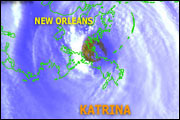Three New Orleans congregations devastated; UUs open homes to refugees
UUA sets up emergency relief fund; members open their homes to refugees from New Orleans
Ministers in the New Orleans area, concerned for the safety of their congregants and certain that many lost homes to flooding or wind, attempted to reach them by phone or email Wednesday but were hampered by downed phone lines and cell towers. There were no early reports that Unitarian Universalists had died, but the three New Orleans-area churches are believed to be seriously damaged.
“We’re just expecting one tragic story after another,” said the Rev. Steve Crump, minister of the Unitarian Universalist Church of Baton Rouge, about an hour northwest of New Orleans. “And the death toll in New Orleans is just going to be horrendous.”
On Wednesday, the mayor of New Orleans, Ray Nagin, said the storm may have killed thousands in his city. He said New Orleans will be totally evacuated and “will not be functional for two or three months,” according to the Associated Press. In Mississippi, state officials have already reported 110 deaths.
Meanwhile, the Unitarian Universalist Association of Congregations established a Gulf Coast Relief Fund to assist affected congregations and individual UUs. All contributions will be distributed through the UUA’s district offices and will be used entirely for hurricane relief. Information about the fund, including a page for on-line contributions, is available at www.uua.org. (See “Related Resources,” right, for a direct link.)
UUA President William G. Sinkford issued a pastoral statement expressing shock and sorrow at the devastation. He added: “I am especially mindful that those unable to evacuate from the affected areas, the poor and the elderly, have suffered disproportionately from the ferocity of this hurricane.”
The aftereffects of the storm proved worse than the storm itself in some places. Storm waters tore holes in the levees that protect New Orleans. Much of the city is below sea level, and flood waters may remain for some time. In addition to the water itself, the area faces increased mosquito populations and water-born diseases that result from lack of sanitation. Most utility services in the city were expected to be out for weeks. Michael Leavitt, the U.S. Secretary of Health and Human Services, said Wednesday that the federal government has declared a public health emergency for the entire Gulf Coast.
Three UU congregations in the New Orleans area were the hardest hit in the region. Community Church Unitarian Universalist is only a few blocks away from the 17th Street Canal, where a 500-foot section of the levee that protected the city from Lake Pontchartrain broke. The neighborhood is totally submerged. Whether the building can be repaired is in doubt.
The 103-year-old First Unitarian Universalist Church of New Orleans is on ground high enough that the building could survive.
Winds destroyed the roof of the North Shore Unitarian Universalist Society in Lacombe, on the other side of Lake Pontchartrain. Crump, the Baton Rouge minister, said efforts were under way Wednesday to put together a crew of UUs to put a tarp over North Shore’s open area.
The Rev. Marta Valentin Chase, First Church’s newly settled minister, had driven to Texas to escape the storm and was attempting to reach parishioners from there. The Rev. James VanderWeele, minister of Community Church, was doing the same from Pine Bluff, Ark. He said he assumed that the church was under water and could be reached only by boat.
Crump said many members of his congregation responded to a call to open their homes to UU refugees from New Orleans. “The number of people who said yes to opening their homes is astounding,” said Crump, adding that people coming out of New Orleans may well be displaced for several months. “We’ll be creating a directory of these people and notifying their ministers of where they are.”
Crump’s own church in Baton Rouge lost five large trees, but had no building damage.
The Rev. Anne Heller, interim district executive for the Southwestern Unitarian Universalist Conference, said Wednesday that offers of help were coming in and would be matched with those who need it. The Southwestern Conference serves congregations in Louisiana as well as Texas, Oklahoma, Arkansas, Tennessee, Missouri, and Mexico. For more information, go to the district website, which is collecting hurricane-related information at www.swuuc.org.
“I’ve had emails from people who don’t know where family members are,” Heller said from her office in New Mexico. “It’s heart-wrenching. We’re working hard to manage some of the needs that people have. It just makes me weep to see on television what’s happening to this beautiful city.”
Eunice Benton, district executive for the UUA’s Mid-South District, said Wednesday that she had received no reports of injuries to UUs or major property damage to UU churches in the district, which includes Mississippi, Alabama, and Florida. Hurricane information is being posted on the district’s website, www.msd.uua.org.
The UUA’s website also includes a statement from the Unitarian Universalist Trauma Response Ministry and a collection of resources for families and children.
Visit uuworld.org for continuing coverage of Hurricane Katrina's impact on Unitarian Universalists.








